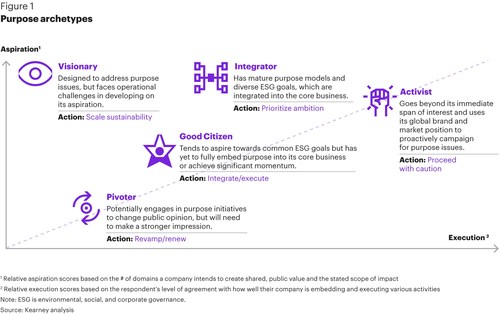The latest Purpose Report from global consultancy partnership Kearney has revealed that just 45% of companies have embedded purpose into their culture, and only 13% proactively campaign for issues related to their stated purpose.
Purpose has become a popular buzzword in recent years, often featuring in mission statements and forming a key component of company culture, as it provides a positive signal to stakeholders that businesses want to contribute to the welfare of society and the environment.

Consumers, workers, and stakeholders from all communities are more informed and have become activist on environmental, social, and governance issues than ever before. Being a good citizen alone has proved to be insufficient and many companies are under the spotlight for simply virtue-signalling via pronouncements, metrics and pledges.
HR Technology News: Paycor Enhances HCM Solution With New Immunization Tracker
Kearney’s Purpose Quotient Index (PQI) compares organisations’ aspirations to be purpose-oriented with how well they are delivering on these commitments, with the discrepancy between the two highlighting their ‘purpose gap’. However, the purpose gap doesn’t just exist between aspiration and execution; Kearney’s data also revealed a difference of opinion within different groups in organisations.
The report findings showed CEOs to be far more positive about their company’s purpose status than employees, with 36% claiming that the business has fully embedded its purpose in the organisation. Just 8% of the CEOs surveyed felt that their company needed to make a stronger impression in this area. Yet, more than half of entry level employees (53%) said that their organisation has yet to fully embed purpose, while nearly four in ten (39%) said that their company needs to make a stronger impression in this area.
To explore these issues further, Kearney has created a spectrum of purpose archetypes, with visionaries and pivoters who aspire to engage with purpose initiatives on one end, to highly engaged integrators and activists on the other. Again, perceptions of progress differed by role with over one third of CEOs scoring their companies as activists or integrators (36%) – which was nearly twice the percentage of middle management (20%).
HR Technology News: Officism, a New Type of Workplace Discrimination, Could Disrupt Post-Pandemic Hybrid Work Plans
Alex Liu, Managing Partner and Chairman of the Board at Kearney, comments:
“Despite most business leaders understanding the importance of purpose, our research reveals clear gaps between positive intent and meaningful outcomes.
These gaps are not just in the company’s operations, but in its aspirations too, with C-suite employees perceiving the organisation’s progress quite differently to middle managers and entry level employees. This needs to be reconciled. Being a good citizen alone is no longer sufficient.
Leaders also need to examine how their product lines, supply chains and business operations can become more diverse, fair and climate-conscious. They need to ask themselves if they can activate purpose to drive lasting competitive advantage and inspire teams into a more joyful and ethical workplace culture.
The urgency is high: consumers, workers, and stakeholders from all communities are more informed and activist on environmental, social, and governance issues than ever before. This presents a huge opportunity for today’s leaders: companies that do good, and be good, will thrive.”
HR Technology News: Clovers Raises $15 Million to Revolutionize Interviewing for the Modern Workforce

